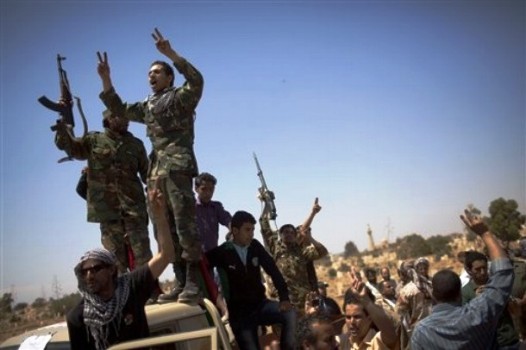Rebels fret for civilians in Kadhafi bastion
Deborah Pasmantier
SHISHAN, Deborah Pasmantier- Anti-Kadhafi fighters voiced concern on Monday over civilians in the besieged town of Bani Walid, as Nigerien sources said prominent regime officials had fled across the border.
They included Moamer Kadhafi's internal security chief Mansour Daw, who was earlier reported to be in Bani Walid with at least two of the fallen strongman's sons, a Nigerien government source said.

Kamal Hodeisa, a defence ministry official, told AFP in Tripoli that anti-Kadhafi fighters would "move if there is an act of aggression by Kadhafi's forces against our rebels inside Bani Walid or if they attack civilians.
"There is debate among rebels whether to go forward or to stay but I think in the end they will respect the deadline," he said, referring to a truce until September 10 to try to negotiate the surrender of the last Kadhafi strongholds.
Abdullah Kenshil, the chief negotiator for Libya's new government, said civilians were being held hostage in the centre of the town, in administrative buildings and in five or six nearby villages.
"Kadhafi's soldiers have also closed the gates of the town and are not letting families leave," he said. "That worries us, we don't want to kill civilians in the attack."
Negotiations for the surrender of Bani Walid, southeast of Tripoli, broke down late Sunday but there was little movement on that front on Monday despite concerns that local families could be held as human shields.
Operational commander Abdulrazzak Naduri told journalists at Shishan, north of Bani Walid, that the National Transitional Council does not "want any more bloodshed."
Local officials said most senior figures had fled with Kadhafi's most prominent son, Seif al-Islam, who according to Naduri left a few days before for Sabha, further south, that is still in the hands of regime loyalists.
Two other sons of Kadhafi, Saadi and Mutassim, were also reported to be in Bani Walid and it is suspected that the strongman himself crossed through the oasis town although it is unclear when.
But Daw and some 10 others were on Monday in the northern Niger town of Agadez, having been brought across the border by a top Tuareg leader allied to Kadhafi, Tuareg sources said.
No clashes were reported on Monday in Kadhafi's hometown of Sirte or the southern oases of Sabha and Al-Jufra.
In Beijing, the foreign ministry acknowledged Libyan officials had visited China in July for talks with "interested companies" but insisted no arms contracts had been signed nor any direct or indirect exports made.
"Chinese companies did not sign arms sales contracts and they did not export military products to Libya," spokeswoman Jiang Yu told journalists, adding her country "does not allow any actions that contravene UN resolutions."
Citing secret documents it had obtained, The Globe and Mail reported that state-controlled Chinese arms companies were ready to sell weapons and ammunition worth at least $200 million to Kadhafi in late July.
It said the papers did not confirm that anything was actually delivered, but senior NTC members said they reinforced their suspicions about the recent actions of China, Algeria and South Africa, the report said.
Meanwhile, a senior commander in the new regime demanded an apology from Britain and the United States after seized documents suggested both countries were complicit in a plan that led to his detention and torture.
Files unearthed from Kadhafi's intelligence archives documented the capture by the CIA of Abdelhakim Belhaj in Bangkok in 2004 and his forcible repatriation to Libya, where he had fought the old regime.
He was then jailed in Tripoli's notorious Abu Slim prison for seven years and maintains he was questioned there by British intelligence officers.
Belhaj, now military commander of Tripoli, told the BBC: "What happened to me was illegal and deserves an apology."
"I was injected with something, hung from a wall by my arms and legs and put in a container surrounded by ice," he said of his time in prison. "They did not let me sleep and there was noise all the time. I was regularly tortured.
"I'm surprised that the British got involved in what was a very painful period in my life," he added.
A British inquiry into alleged complicity in the mistreatment of suspected terrorists said Monday it would look into claims that foreign spy agency MI6 was involved in rendition to Libya.
Britain on Monday re-established its diplomatic mission in Tripoli.
The UN Security Council is on Friday to discuss the launch of a wide-ranging mission to Libya to help tackle police reform, justice and election preparations, a UN diplomat told AFP on Monday.
-------------------------------------------------------------------------------------